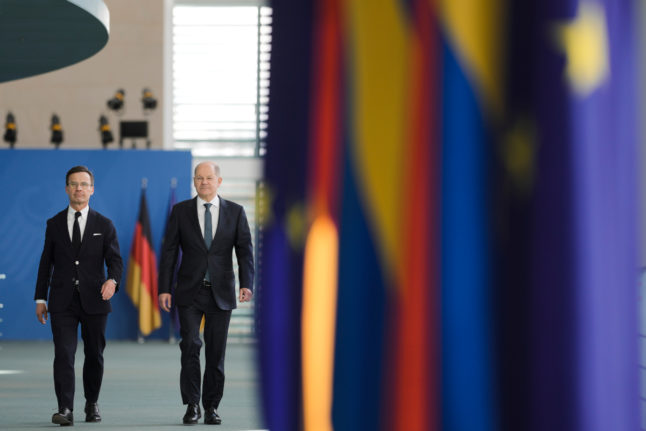Pekka Haavisto, whose Green League party has yet to take a position on joining, launched the debate by presenting the results of the Finnish government’s report on changes to the security climate, published last Wednesday.
“I see it as important that Finland and Sweden take their decisions at around the same time and in the same direction,” he said.
“Simultaneous processes would also make it easier to act in the case of reactions from Russia. But in all actions, the countries take their decision independently.”
Charly Salonius-Pasternak, a senior research fellow at the Finnish Institute of International Affairs, said in a Twitter thread on the debate that this should be read as saying, “Finland is joining, Sweden has time to catch up”.
Parliament of #Finland is set to begin debate about changed security environment and needed changes regarding 🇫🇮 security policy (read seeking NATO membership).
🧵 focusing on what’s said implicitly and explicitly (follow #turpo, as other Finns are also sure to comment)
— C Salonius-Pasternak (@charlyjsp) April 20, 2022
The report, as summarised by Haavisto, boils down to three main points, that Russia has shown itself increasingly willing to take high-risk military actions, that it has shown itself willing to deploy hundreds of thousands of troops against a neighbour, and that it is increasingly talking of using nuclear weapons, against which Finland has no deterrence.
“In a situation where Russia is trying to build a sphere of interest and is ready to use military force, that could lead to Finland’s freedom of manoeuvre being curtailed if we do not react,” he said.
The debate saw some 120 of the Finnish parliament’s MPs make statements, with all the parties laying out their positions.
Even representatives of those parties which have historically been most strongly opposed to Nato membership, such as the Left Alliance, expressed an openness to joining if that was the decision of the parliament as a whole.
Jussi Saramo, from the Left Alliance, criticised the government report for not describing the downsides and dangers of Nato membership sufficiently, and said it was therefore up to MPs to fill in the gaps.
“When, for example, the disadvantages of joining the alliance have not been given any prominence, and it is therefore impossible to draw any conclusions, this important work for security and democracy has been left to the parliament,” he said.
But even he admitted that neither staying out of Nato nor joining the alliance were “problem-free or risk-free”. Saramo agreed with Haavisto that it would be risky for Finland to join Nato if Sweden remained outside the alliance.
READ ALSO: The likely timetable for how Sweden could join Nato
Antti Häkkänen, group leader for the Social Democrats, however, stressed that Finland should still feel able to join if Sweden decided not to, summing up Finland’s message to Sweden as: “You’re welcome to join us, but we’re will also go in without you if it’s necessary,”
While the Social Democrats have yet to formally take a position in favour of joining, Häkkänen said Russia’s actions had “brought Finland several steps closer to the necessity of a military alliance”.
Several MPs rejected the Nato alternative reportedly promoted by Sweden’s defence minister Peter Hultqvist since Russia’s invasion, which would see Sweden and Finland forming a military alliance with the United States.
“The sort of alliance between Sweden and Finland which has emerged in the debate is not a comparable alternative,” said Ville Tavio, from the populist Finns party.
He called for the application to be made before the Nato summit held in Madrid at the end of June.
After the debate, the parliament’s foreign policy committee will write a report, after which Finland’s government, in combination with the president, could submit a statement proposing that Finland applies to join Nato.
Salonius-Pasternak concluded his thread by remarking on how far Finland’s Nato debate has moved in such a short time.
“When those parties/individuals who’ve most opposed Finnish NATO membership are on the fence, but open to supporting it after extensive debate, then I think the direction of the wind and journey is clear,” he said. “It truly is improving Finland’s security that *everyone* is focused on.”
“One thing is clear: the wall of political unity and consensus being constructed – speech by speech – in the Finnish parliament is stronger than anything Russia could throw at it. The atmosphere is respectful (of differing views) and solemn, the purpose palpable.”



 Please whitelist us to continue reading.
Please whitelist us to continue reading.
Member comments